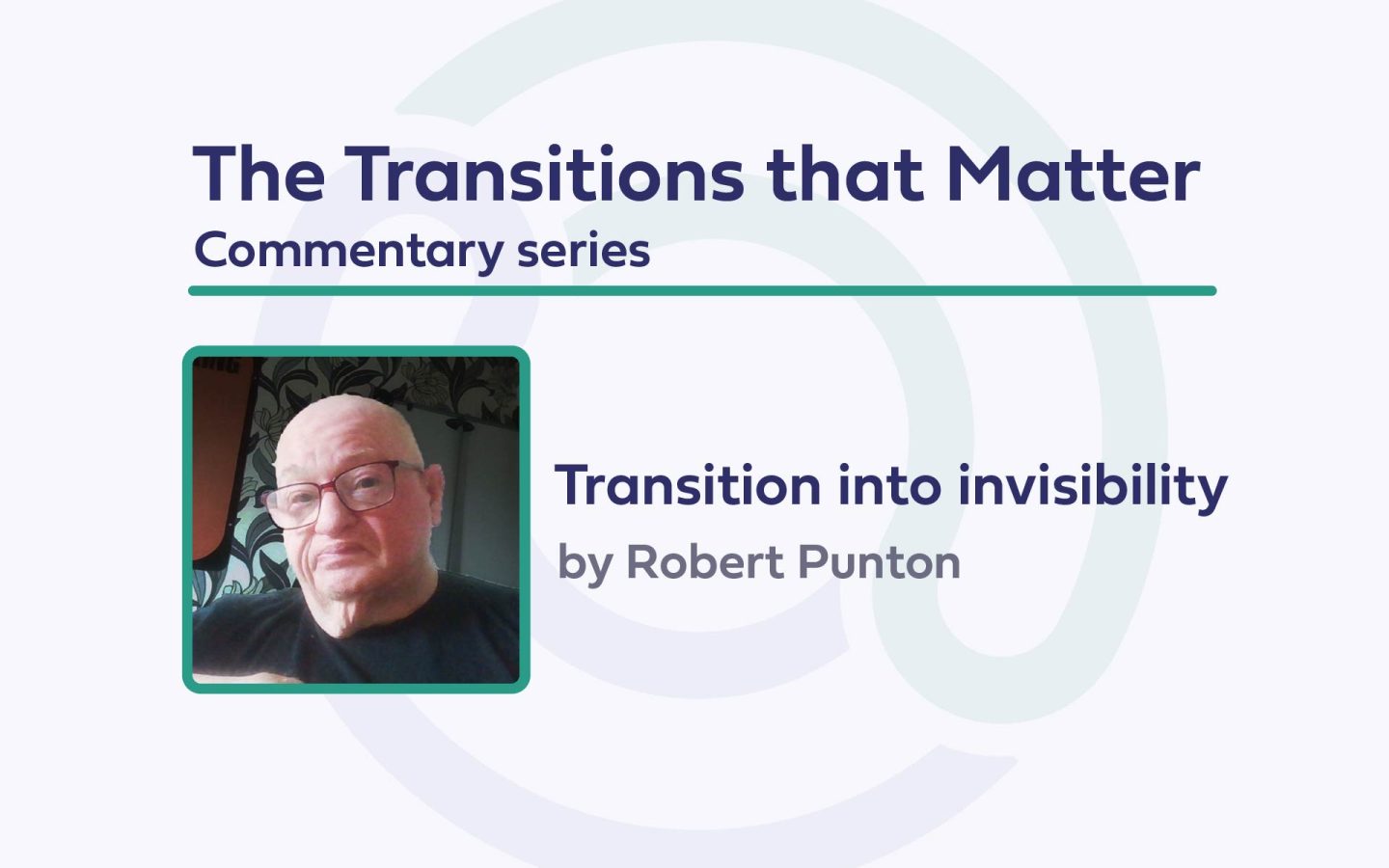This is a guest commentary. The views and opinions of the author may not always represent those of the Centre for Care.
Transition into invisibility
The title of this blog comes from a song by Peggy Seeger, Invisible Woman, taken from the album First Farewell. I was struck by the lines:
You will start vanishing too.
You will get old, left out in the cold.
The ghost army’s waiting for you
Peggy Seeger
Transition is a vital part of life, and many discussions, papers, and funding go into the research and practice of transition. Nine out of ten people will automatically think of the transition from adolescence into adulthood, and whilst recognising this is essential work, we must realise it is not the only time in our lives we experience the upheaval of transition.
I am talking, from a disabled person’s perspective, about the transition from middle age to old age or as Peggy Seeger says becoming an ‘Invisible Woman’ – I do not think gender matters here: if you become invisible when you grow older, then such things like disability, gender, race, religion, and sexuality, and everything that might mark you out for discrimination become less important as no one chooses to see you anyway. I am willing to be challenged on this point.
You could argue that as disabled people we are barely visible in society to begin with so the transition could be easier and smoother for us than our non-disabled peers. I think not but look forward to hearing other people’s views.
My experiences
Why this subject has not been given more thought? Especially, as we are living in an ageing society and as people grow older, they acquire disabilities; even those with existing conditions find themselves acquiring more ailments and impairments. I can personally provide evidence on that score. As I swiftly move through my fifties towards my sixties, I spend more time visiting my GP and getting to know every hospital department. My medicine intake becomes a meal in their own right.
One factor is that western culture puts negative values on growing old. Without getting too political, western nations, not least here in the UK, are based on capitalist values: the stronger, fitter, younger you are, the more economic value society places on you. As a society, we celebrate speed and economic maximisation of time. As you grow older and more unstable, as you cost the state more than you bring in, you change from an asset to a burden.
There is so much more we could say here but we have started the conversation.
Moving forward
Society’s attitudes are slowly becoming more progressive, with people putting forward counter ideas such as the slow movements: slow eating, slow walking, slow football. Similarly, the growing concern for mindfulness and wellbeing can only help. As we become a multi-cultured nation and other cultures’ attitudes towards their elders mingle with ours, hopefully attitudes will improve, and we can move towards a more holistic society with a greater respect for the experience of ageing. Research and generational thinking will develop through time, but not without thought and effort.
However, currently, for whatever reasons, we do not think much about older people and our systems reflect that. We need to think how to change our systems and thinking so that there is more attention to older transitioning.
Things need to change quickly. We are an aging society. Medical science means we will continue to live longer. And current thinking and capitalist systems cannot cope.
You may ask, what does my ideal transition look like?
The answer is easy in theory and hard in practice. As I change over time, continue to see me for who I am, not what you think I am. If you do not know something, ask me.
We need to think about what we want as individuals and collaboratively as a society. To quote the late great Nelson Mandela:
It is said that no one truly knows a nation until one has been inside its jails. A nation should not be judged by how it treats its highest citizens, but its lowest ones.
Nelson Mandela
The same applies to how we treat our old.
There are reforming answers; there are revolutionary answers.
One thing is certain, before you produce answers you must first raise the question.
Put simply, what if anything are we going to do about transitioning into ageing? To ensure we do not disappear!





